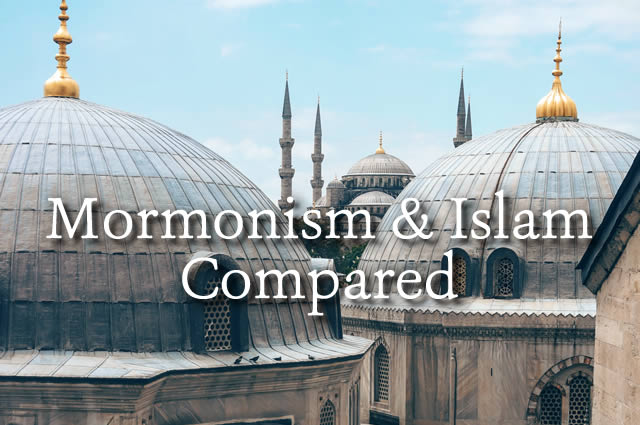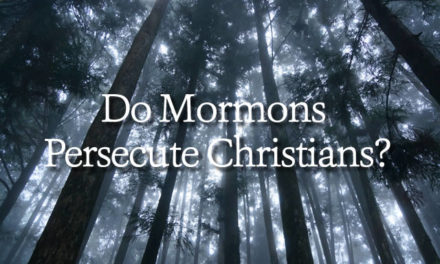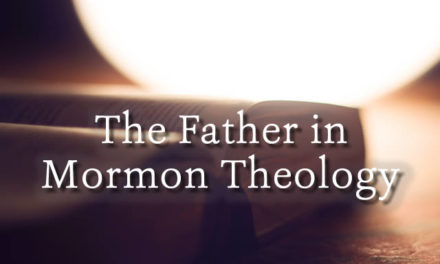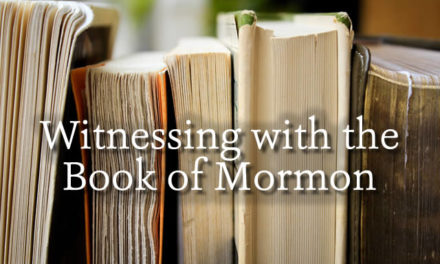What happened on 9/11 that both Islam and Mormonism have in common? Everyone knows that Islamic terrorists hijacked planes and flew them into buildings killing thousands of people on September 11, 2001. However, few know that on September 11, 1857 Mormons under the direction of Brigham Young and John D. Lee attacked a wagon train from Missouri and Arkansas passing through Utah and massacred all its members except for the very young who were kidnapped into Mormon families. This is known in history as the Mountain Meadows Massacre. It was the largest act of religious terrorism on the North American continent until 2001.
There are many interesting parallels between Mormonism and Islam. Their past violence is not the only point of connection. The similarities between them has caught the attention of many others including Mormon leaders. Hugh Nibley, Professor of History and Religion at Brigham Young University wrote an article outlining many of them. In the Ensign magazine of March 1972 he said, “First as to the likeness: Islam owed its impact on the world and its great appeal to its followers to the electrifying announcement that God had again spoken from the heavens and that after 600 years of silence the voice of a prophet was again heard in the land.”
On April 13 the Los Angeles Times published an article by David Haldane that described a growing relationship between Mormons and Muslims. Mormons have been seeking positive relationships with a number of ethnic and religious groups including Protestants, Roman Catholics, and Jews. However, it might come as a surprise that their efforts toward the Muslims have been enthusiastically received. It is likely that Mormons and Muslims in America are friendly toward each other because of very similar past experiences, especially being openly rejected by the majority Christian faith.
In September of 2007 the Pew Forum on Religion and Public Life, part of the Pew Research Group, published the results of a poll of Americans and their views of Muslims and Mormons. The poll results showed a substantial lack of knowledge by Americans of both religions. Interesting one word descriptions of each faith were broken down between the positives and negatives. On the Muslim side people described it positively as “devout, peaceful, dedicated.” On the negative side they said, “fanatic, radical, terror.” For the Mormons the positive comments included, “family, dedicated, devout.” On the negative side people said, “polygamy, bigamy, cult.” Clearly the teachings and histories of both groups have left an impression on society that they find difficult to shed.
Comparisons
The two religions compare with each other both in similarities and dissimilarities. Both have histories they want to shed as described above. Their histories include violence and aggression. Their scriptures claim a heritage in “the Book,” the Bible, as a foundation or predecessor, for their truth claim. Both have origins that they claim can be traced to Christianity and the Judaism. It has been said that Mohammed was trying to establish a faith that was derived from Judaism and Christianity but his “revelations” were rejected by both faiths and so he became hostile to both Jews and Christians. In a similar vein early Mormon leaders became hostile to Christian leaders who rejected Mormonism as heresy.
Dissimilarities
Even though Mormons and Muslims feel an affinity toward each other based upon their experiences in America, and though there are many historical and doctrinal analogies between the two religions, Mormonism and Islam are very different from each other. Here are some of the more obvious;
Monotheism/Polytheism – Islam is monotheistic while Mormonism is polytheistic. Islam holds that only Allah is God. They do not believe Jesus is the Son of God. They do not believe there is any other “Person” in a godhead beside Allah. Christian monotheism holds, on the basis of clear teaching from scripture, that the “one true God” is a Triunity, three Persons in the One God. Mormonism on the other hand holds to a tritheism (three gods, one in purpose) for mankind on earth, but also holding that there are many other gods ruling other worlds in the Universe, and you can become one of them if you keep all the laws and ordinances of the Mormon gospel.
Living Prophet/Dead Prophet – Mormonism speaks of having a “living prophet” as very desirable and valuable. Their thought is that a living prophet can speak to current issues facing the LDS church and voice God’s own counsel about the issue. Though this sounds good to the biblically uninformed it presents a very dangerous problem. LDS “prophets” in the past have given revelations that were convenient PR at best and utterly false at the worst. Deuteronomy 13 and 18 guide us in how to think about anyone claiming the mantle of a prophet. They must be 100% accurate or, in the Old Testament system, they are to be “rocked to sleep.” Under the New Covenant we do not show them respect. The “Prophet” of Islam, Mohammed, died. Though Muslims claim he ascended to heaven from Mt. Moriah (Jerusalem). Islam today does not have a central figure, like Mohammed, who is able to speak the unchallenged words of Allah.
Many Revelations/Last Revelation – Mormonism hold’s that their living prophet is able to give new revelations, i.e., scripture, to their members. Since the 1820’s Mormonism has introduced the Book of Mormon, Doctrine and Covenants, the Pearl of Great Price, and other situational revelations such as the abandonment of polygamy. Islam has only the Quran since the time of Mohammed. Though the Hadith is a very important as supplementary information about Mohammed’s sayings and stories from his life it is not considered a new revelation.
Progressive/Regressive – Mormonism is a very adaptive religion compared to Islam or most of the cults. They are “joiners” in the sense that they participate in their community and culture and don’t draw apart in isolation. Islam, on the other hand, is trying to re-establish 7th century Arabian culture. The standards of the Quran are not adaptive. They are fixed in the culture of Mohammed’s day and in his own view of the world. The Bible’s message can be adapted to a different time and place without diluting the message. The Quran on the other hand was written in isolation from the larger world and bears the marks of that isolation. The Book of Mormon was also written in isolation and it too bears the mark of that isolation. Joseph Smith told a story in the Book of Mormon that cannot be verified by history or archaeology. The ignorance of an 1820’s New York storyteller is born out in page after page of the Book of Mormon.
Similarities
Founded by a “Prophet” – Both Islam and Mormonism place the role of a prophet at the top of their hierarchy of authority. Though Christians also ascribe a high stature to prophets we see that role essentially as ended with the completion of the New Testament. Islam recognizes Moses and other Old Testament prophets as wearing the prophets mantle. They recognized Jesus, or Issa in Arabic, as being one of the more important prophets but not as the Son of God. Muslims regard Mohammed as the greatest and final prophet. In Islam there are two categories of prophets, the ‘rasul’ and the ‘nabi’. Both are prophets in the sense of bringing a message from Allah but the message of the ‘rasul’ will be written as in Mohammed and the Quran. The President of the LDS church has filled the prophet role. He is commonly referred to as a “Prophet, Seer, and Revelator.” After the deaths of both Smith and Mohammed their followers divided over who their successors would be. These divisions continue to the present day.
New Scriptures – In their role as prophets Joseph Smith and Mohammed introduced new scriptures to their followers. The Quran and Book of Mormon were purportedly offered as being built on the foundation of scripture that came before, namely the Old and New Testaments. In this sense Islam can be considered an early “cult” of Christianity as Mormonism is also considered. Because of the large volume of contradictions and conflict with the Bible both Mormons and Muslims will say the Bible has been corrupted by the Christian church and thus is not to be trusted. This almost universal assertion by the “Bible-based” cults is a reminder of what the serpent asked Eve in the Garden of Eden, “Hath God said…?” An important point to make to Mormons is that the Bible tells a whole story. There is nothing that seems to be left out making one wonder about the “plot.” The early chapters of Genesis tell us where we came from. From the later chapters of Genesis to Jude tell us why we are here and how to live. The Revelation tells us where we are going. This storyline found in the Bible is not found in either the Book of Mormon nor the Quran.
Angelic Visitors – Joseph Smith claims that the angel Moroni appeared to him and told him where to find gold plates hidden in a hill named Cumorah. These plates contained the record of an ancient people who had migrated from Israel to the Americas and to whom Christ appeared after His resurrection to tell them the “good news” of Mormonism. Mohammed claims that the angel Gabriel visited him and communicated the message of the Quran. Both also claimed visions. Galatians 1:6-9 warn us against receiving any message from angels that contradicts scripture. Anyone receiving such a message is to be “anathema,” or cursed. Both Smith and Mohammed were concerned over the divisions among God’s people and both set about to establish the “one true” and pure religion. As an evidence that their messages were from God the followers of both Smith and Mohammed point to their uneducated status implying that only God could speak such “truth” through them.
The message of the Book of Mormon is essentially a history whereas the Quran is a book of sayings much like Proverbs. An interesting sidelight on Mormonism is that the names Moroni and Cumorah occur together in geography. Moroni is the capital city of the Comoro islands situated between the African continent and Madagascar. Was Joseph Smith getting his names from other sources? It would not be the only such incident.
Polygamy – Perhaps the most commonly recognized similarity is that both condone polygamy. In Mormon scripture, Doctrine and Covenants, Section 132, polygamy is called “an everlasting covenant” and was practiced from the time of Joseph Smith until 1892 when the LDS church banned it as a condition of Utah’s Statehood. Mormons believe they will resume the practice of polygamy in the Celestial Kingdom. However, “fundamentalist” Mormons still practice polygamy as is illustrated in the national media by the Fundamentalist Church of Jesus Christ of Latter-day Saints, or FLDS. According to Islam a Muslim man may have four wives. Also, the hope for the Muslim man is to enter Paradise where he will be given 72 virgins. Mormon men on the other hand hope to achieve godhood where they will then populate a world that they organize with the offspring of himself and his plural wives. Both religions are very fleshly and sensual in this regard. For Christians there is neither marriage, sexual relations, nor offspring in heaven. We will be Christ-centered there rather than self-centered. Both Islam and Mormonism have a problem in their view of women by relegating them to being sexual objects.
Political Goals – The sword spread Islam. The Muslims would have conquered Europe if Charles Martel at the Battle of Tours had not stopped them. The Jihad is a religiously motivated political “crusade.” The Mormons formed the Nauvoo Legion after being run out of New York and Missouri. Smith offered himself as a candidate for President of the United States. He was not elected! His successor, Brigham Young, was the Governor of the Utah Territory and the LDS Church controlled the government. Though Mormons today do not have political aspirations as a group they are prominent in the political field. As stated earlier, they are “joiners.” Mitt Romney’s Presidential candidacy was probably the opening of a new era for Mormons to seek that highest office.
Conclusion
The comparison of Islam with Mormonism is an interesting exercise but does not help us in our witness to either religion. What it does do is show us that “there is nothing new under the sun” as Solomon said in Ecclesiastes. When man creates a religion he is a victim of his own perspectives, passions, assumptions, and knowledge. He cannot remain logically consistent throughout. Nor can he write history in advance. He is limited by his own culture and life experience and hence his writing will lack the transcendent quality of something inspired by God.
The four common patterns found in cults that Watchman Fellowship uses are illustrated in these two religions. Both Mormonism and Islam “Add” to the Word of God with the Book of Mormon, etc., and the Quran. Both religions “Subtract” from Jesus by saying He is less than Eternal Deity. Both religions “Multiply” the works required by salvation. And finally, both “Divide” the loyalties of their followers between God and man.
“But though we, or an angel from heaven, preach any other gospel unto you than that which we have preached unto you, let him be accursed.” Galatians 1:8
By David Henke






